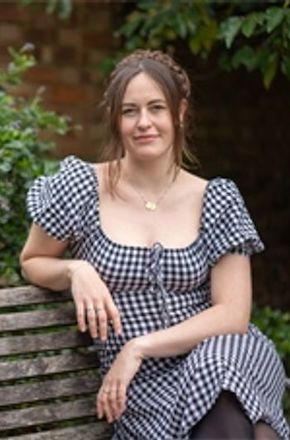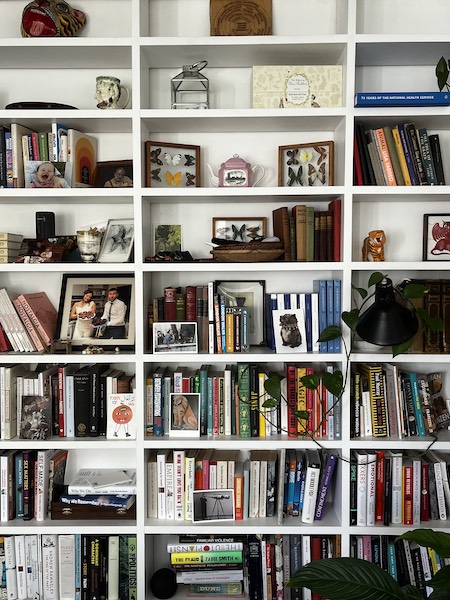A jumble of many things
by Agnes Arnold-Forster
Agnes Arnold-Forster’s Nostalgia: A History of a Dangerous Emotion explores what nostalgia means and how it’s defined. The book takes us through the history from when it was deemed an illness and could have you sent away to hospital, to today’s obsession with marketing nostalgia to sell products to making countries great again! This is a fascinating read into an emotion that is hard to define but very easy to feel.
Tell us about the bookshelves in your home.
Almost all of our books are housed on a wall of shelves in our living room. The shelves came with the flat, which is good since they’re expensive to install, and were a major selling point. Our books are jumbled together with other things, like postcards, knick-knacks, lamps and plants. And they’re not arranged in any particular way at all. The bigger ones are at the bottom, where they fit, and smaller ones are up high, but otherwise it’s a mess. I think I’ve read most of them, and a slightly shaming number are copies of books I’ve written or edited – but that’s only because the publishers sent me multiples and I’m too embarrassed to give them away.
Which books are your most recent bookshelf additions?
I’ve bought hard copies of a few books recently which I’ve then only listened to as audiobooks. The Fraud by Zadie Smith, for example. I’m currently on maternity leave and reading has proven difficult. But as anyone with a baby will know, you spend an extraordinary amount of time walking, hoping and praying they’ll fall asleep. This has been my prime book-listening time.
Do you judge people by their bookshelves?
I’d love to say no, but honestly, yes. Although I don’t at all judge people for their fiction-reading habits, and I love so-called ‘low-brow’ and ‘high-brow’ fiction equally. I’m a little more critical when it comes to non-fiction because it can be revealing not so much about people’s tastes, but about their politics (small p or large). Which isn’t to say I’m necessarily disapproving, but I do think the books you read reveal much about your leanings and inclinations – this is definitely true in my case!
Which is your most treasured book?
My most treasured book is a 1758 edition of Paradise Lost printed by John Baskerville. I’m a historian and I like old things. It’s a beautiful book and, most importantly, it belonged to my grandmother, who is dead and much missed.
All my childhood books are still at my parents’ house. My mum keeps trying to get me to take them, but I don’t have the space and my baby is still too small to read.”
What do your bookshelves say about you?
This question made me think of the TV show Through the Keyhole, which when I was a kid was presented by Loyd Grossman. It was sick-day television and you had to guess the minor celebrity from their home and belongings. If I ever went on a revived Through the Keyhole, I think you’d definitely be able to tell that I’m a historian. You could probably also tell that I’m a Labour voter, as there are quite a few biographies of left-wing politicians and such like.
What’s the oldest book on your shelf?
The oldest book is definitely Paradise Lost, but I also have a multi-volume, early twentieth-century children’s encyclopedia. I’ve always liked that it was published before the discovery of the planet Pluto.
Do you rearrange your bookshelves often – and where do your replaced books go?
Never. I’m pretty lazy.
Do you have any books from your childhood on your shelf?
I’ve had the encyclopedias since I was a kid, but otherwise all my childhood books are still at my parents’ house. My mum keeps trying to get me to take them, but I don’t have the space and my baby is still too small to read.
Book lender, book giver or book borrower?
I’m a book lender, a book giver, and a terrible book borrower. If you like your books then you shouldn’t lend one to me. If I return it at all, then it’ll come back ragged, dog-eared, and potentially water-damaged. I’ve never really understood the desire to preserve normal paperbacks in the same state in which they were first purchased. Books are made to be read, used, abused, etc. I make sure any potential lenders know this about me, and if someone really treasures their books, then I don’t borrow from them.
Whose bookshelves are you most curious about?
I’ve never considered this question before. But thinking about it, I’d love to know what Werner Herzog is reading.
And finally, what book aside from you own would you recommend to readers about nostalgia (fiction or non-fiction or both)?
I think everyone should read Owen Hatherley’s The Ministry of Nostalgia. It’s insightful, original, and funny.
Introduced and compiled by Sonia Weir
Shelves by Agnes Arnold-Forster
—

Dr Agnes Arnold-Forster is a historian at the University of Edinburgh. She has also worked at McGill University, King’s College London, UCL, and at the Centre for the History of Emotions at Queen Mary University of London. She is the author of two academic books, one about cancer and the other about surgery, and has written widely for academic, medical and mainstream outlets. She has also appeared on BBC Radio and TV, consulted for television dramas and documentaries, and worked closely with the Science Museum, the Wellcome Collection, and the Royal College of Nursing. She lives in London. Nostalgia: A History of a Dangerous Emotion is published in hardback, eBook and audio download by Picador.
Read more
agnesarnold-forster.com
@agnesjuliet
@PicadorBooks
Sonia Weir is a contributing editor to Bookanista. She started the Ultimate Reads and Recommendations Facebook group in December 2018, which now has over 700 members from all over the world. The group is inclusive and aimed at every reader, no matter the books, authors or genre.
Ultimate Reads and Recommendations
Instagram @soniaweir
Twitter @soniaweir


